Opinion: ‘Where is the vision in the WECA mayoral race?’

Dr Thom Oliver, a senior lecturer in politics at UWE Bristol, shares his expert opinion ahead of the WECA mayoral elections on 1 May. He leads the Qualitative Election Study of Britain and is part of the team running the Bristol Civic Leadership Project which has explored leadership and governance in the city and region since 2013.
Election fever is sweeping the West of England region, or so the theory goes.
As the race to elect the next Mayor of the West of England Combined Authority (WECA) heats up the excitement is presumably, being felt across Bath and North East Somerset, Bristol, and South Gloucestershire. Even a few envious glances are being cast from North Somerset.
Or perhaps not. Turnout for this election has not traditionally been high. When Tim Bowles was elected in 2017, turnout was just 29.7%. In 2021, Dan Norris was elected with 36.6% of the vote. This time, with no local council elections or other contests taking place on the same day, there is little to drive up turnout. Voters will need to be actively inspired to make the effort to choose a candidate for a role that is still poorly understood and not widely seen as relevant to day-to-day life.
So far, the campaign has stuttered and stalled. Despite efforts from local media, visiting ministers, sector leaders, and the usual parade of party activists dressed up as concerned residents, public interest remains low, perhaps opening the door to an unpredicted outcome.
Which raises a bigger question: what do we actually want in a WECA Mayor?
Candidates, their advocates, sponsored videos, and leaflets tell us they have a track record of ‘getting stuff done,’ being excellent at bringing people together, being seasoned in meetings at the highest levels, and adept at working across sectoral boundaries. But beyond that, what qualities do voters actually respond to?
Voting choice is rarely a purely rational decision. If choosing a mayor were like picking a bottle of washing-up liquid, we might base our decision on familiarity, environmental credentials, or which one is on offer. But politics is far more complex. Voter choice combines logic and emotion, aspiration, and frustration, lived experience and gut instinct.

In the Qualitative Election Study of Britain, which I lead, we explore with voters across the UK this question as we discuss elections and leadership. The findings offer useful clues for understanding what people really look for in those who seek to lead them. There are a number of elements that emerge from those voter voices from the study which has run since 2010.
Authenticity and honesty top the list. Voters are often sceptical of career politicians and respond more positively to those who speak plainly and seem to live their values. It is less about policy agreement and more about believing the person believes in what they are saying.
Authenticity and honesty are a recurrent theme, voters are often sceptical of career politicians and respond more positively to those who speak plainly and seem to live their values. It is less about policy agreement and more about believing the person believes in what they are saying.
Closely related are trust and integrity. Voters are less forgiving of politicians who bend the truth or change positions to suit the political wind. Trust can be hard to win, but when a leader is seen as consistent and “not playing the game,” it counts.
Moral character and values also play a role, qualities like fairness, compassion, and even patriotism are often cited when voters explain their choices. These are not abstract ideals; they are often the lens through which voters assess whether someone is "on their side."
That said, competence matters too. Especially in times of crisis or uncertainty, voters want to feel that leaders can make tough decisions and manage systems effectively. Managerial skill and decisiveness become essential qualities.
Empathy and connection are also important. Voters appreciate leaders who understand the challenges they face be it housing, jobs, health, or transport. Leaders seen as out of touch rarely inspire confidence and are frequently criticised.
And then there's vision and narrative a factor that feels conspicuously absent in this campaign. Across the study our participants often want the sense of leader that are going somewhere, giving a sense of direction, a hopeful story about the future, and a sense of purpose in terms of ideas, asks and aspirations.
Ideas, aspirations, and the missing narrative
Former mayor of Bristol George Ferguson recently challenged the 2025 candidates to move beyond the "painting by numbers" approach. So far, many of the big-ticket manifesto items, already planned rail stations, and integrated ticketing, bus franchising are recycled from 2017 and 2021 manifestos. All may be important; franchising could be transformative, and recent changes have shifted it into the realm of possible.
What is missing is a sense of ambition and transformation. Few candidates are setting out bold "asks" of central government, whether that’s new powers, more funding, or control over retaining and spending more local taxation (locally generated revenues often get sent to Whitehall before a slice is sent back to the region). The best-known and most effective mayors, like Andy Burnham or Andy Street, did not just manage what they were given; they demanded more and fought for their regions. They went to government with a clear ask of what they needed and challenged the government to deliver on their rhetoric of devolving more powers, and empowering mayors to make the difference for their local areas.
To make the most of this role, the West of England needs a mayor with ideas big enough to reshape what the job could be, not just what it is. That is having a vision, a distinct and clear ask, and a willingness to bring people together to make that case in Westminster and Whitehall.
Related news

22 July 2025
Angellica Bell receives honorary doctorate from UWE Bristol
Angellica Bell, a prominent figure on British television and radio, has been awarded an honorary degree by UWE Bristol.
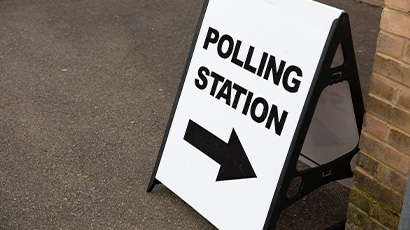
04 July 2024
Opinion: ‘Generation Z risks having their concerns sidelined in the General Election’
As the polls open to millions of voters, UWE Bristol student Phoebe Challis asks what the political parties offer the younger voter.
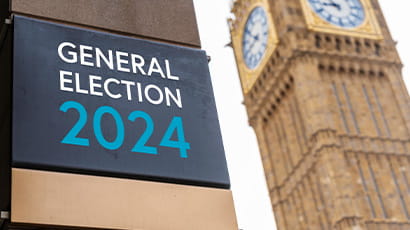
17 June 2024
Opinion: Stats, leaflets, and claims - how to navigate the political battlefield
As political leaflets begin to clog the letterboxes of homes across the UK, how can you discern the truth amidst the claims made by the political parties?

29 April 2024
Opinion: Bristol Council elections - back to the future?
Two UWE Bristol academics give their views on what opportunities and challenges lie ahead following the Bristol Council elections on 2 May.

07 March 2022
New report scrutinises Bristol referendum options that will decide how council is run
A report published today explores the pros and cons of the Bristol City Council leadership options ahead of the referendum in May, which will determine whether Bristol continues to have an elected mayor.

19 February 2021
New partnership launched between UWE Bristol Watershed and streaming service MUBI
Watershed is launching a series of panel discussions in partnership with the Philosophy Politics and International Relations departments at UWE Bristol.
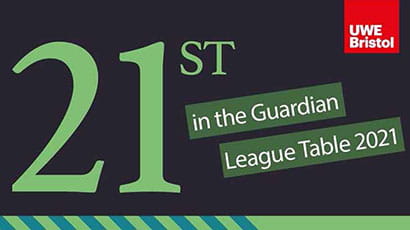
07 September 2020
UWE Bristol rises to 21st place in UK in Guardian University Guide 2021
UWE Bristol climbs to 21st place in the UK in annual Guardian university league table.
You may also be interested in
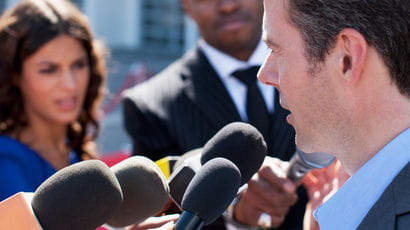
Media enquiries
Enquiries related to news releases and press and contacts for the media team.
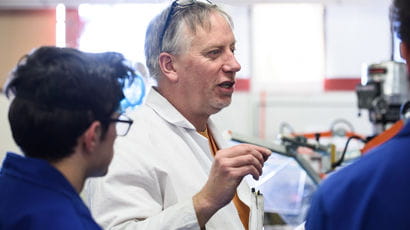
Find an expert
Media contacts are invited to check out the vast range of subjects where UWE Bristol can offer up expert commentary.






